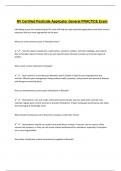NV Certified Pesticide Applicator General PRACTICE Exam
Identifying a pest and researching its life cycle will help you plan pesticide applications and other control
measures that are most appropriate to the pest.
What are some common pests in Nevada homes?
✔️✔️ Common pests include ants, cockroaches, scorpions, spiders, termites, bedbugs, and rodents.
Due to Nevada’s desert climate, there are also specific pests like bark scorpions and certain types of
spiders.
Why is pest control important in Nevada?
✔️✔️ Pest control is crucial because Nevada’s warm climate is ideal for pest reproduction and
survival. Effective pest management helps protect health, property, and prevents the spread of diseases
and allergens caused by pests.
How can homeowners prevent pest infestations in Nevada?
✔️✔️ Homeowners can seal cracks, eliminate food and water sources, keep trash covered, and
maintain regular pest control services to prevent infestations. Proper landscape maintenance also helps
by removing pest harborage areas.
What should homeowners do if they find a scorpion inside their home?
✔️✔️ Homeowners should use caution and avoid direct contact. A vacuum can be used to safely
remove the scorpion, or they can call a pest control professional for assistance, especially if scorpions
are a recurring problem.
How often should pest control treatments be applied in Nevada?
,✔️✔️ Regular treatments every 2–3 months are recommended for effective year-round control,
though specific pest issues may require more frequent treatments.
Why are termites a particular concern in Nevada?
✔️✔️ Termites are a concern because they can cause significant structural damage over time.
Drywood termites, common in Nevada, live within wood and can be difficult to detect, making regular
inspections important.
What are signs of a rodent infestation?
✔️✔️ Signs include droppings, gnaw marks, scratching noises, and chewed food packaging. You may
also notice a musty odor or see nesting material.
What role does proper landscaping play in pest control?
✔️✔️ Keeping plants and shrubs trimmed, removing excess mulch, and clearing debris reduces areas
where pests can hide and thrive, helping to keep pests from entering the home.
How can homeowners safely store pesticides?
✔️✔️ Pesticides should be stored in their original containers, out of reach of children and pets, in a
cool, dry location. Following label instructions is essential for safe storage.
What are natural ways to deter pests in Nevada?
✔️✔️ Essential oils like peppermint or citrus, diatomaceous earth, and physical barriers can deter
certain pests. However, professional pest control is often more reliable for persistent infestations.
What types of spiders are commonly found in Nevada?
,✔️✔️ Common spiders include wolf spiders, cellar spiders, and occasionally venomous spiders like the
desert recluse and black widow, which require caution if found indoors.
What health risks do pests pose to Nevada residents?
✔️✔️ Pests like cockroaches, rodents, and mosquitoes can spread diseases, trigger asthma, or cause
allergies. Scorpions and certain spiders can also deliver painful, sometimes dangerous bites.
How does Nevada’s climate affect pest activity?
✔️✔️ The hot, dry climate encourages pests that thrive in desert conditions, like scorpions, ants, and
some rodents, making consistent pest control essential year-round.
How can you identify a bedbug infestation?
✔️✔️ Signs include small blood spots on bedding, tiny black droppings, shed skins, and itchy red bites
on the skin. Bedbugs hide in cracks and crevices, especially near beds.
What can residents do if they have recurring pest problems?
✔️✔️ Regular pest control services and inspections are recommended for long-term management,
especially if recurring pests like scorpions or rodents persist.
Select one:
True
False ✔️✔️True
There are nine required parts to a pesticide label. Which of the following is NOT one of the nine required
parts?
, Select one:
a. Use classification
b. Safety Data Sheet
c. Name and address of the manufacturer
d. Precautionary statement
e. Ingredient statement ✔️✔️b. Safety Data Sheet
When a plant has "abnormal physiology" it may be an indication that the plant is:
Select one:
a. preparing to set seed.
b. an annual or perennial.
c. suffering from a plant disease.
d. done flowering for the year.
e. suffering from a plant disease. ✔️✔️c. suffering from a plant disease.
Which work sites are all covered by the Worker Protection Standard (WPS)?
Select one:
a. Farms, forests, nurseries, and greenhouses
b. Roadsides, rangelands and pastures
c. Ditch banks and ornamental ponds
d. Parks, hotels and greenhouses
e. Parks and golf courses ✔️✔️a. Farms, forests, nurseries, and greenhouses
(These are the work sites covered by the Worker Protection Standard.)
Contact herbicides kill the plant only where the herbicide chemicals touch the plant.




